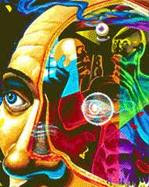Nursing Diagnosis for Hallucination - Altered Sensory Perception
Perception is sensory responses to stimuli that come from outside, where the stimulus may be either stimulation of sight, smell, hearing, taste and touch. Interpretations of the stimuli that come from the outside it may get interference, so there was a misinterpretation. Misinterpretation occurred partly because the existence of exceptional circumstances that affect, such as anger, fear, excited, sad and passion that culminated resulting in disruption or change in perception (Triwahono, 2004).
Altered Perception is the human inability to distinguish between stimuli that arise from internal sources such as thoughts, feelings, somatic sensations with impulses and external stimuli. With a view that humans still have the ability to compare and know which one is the response from outside himself. Humans who have a healthy ego can distinguish between fantasy and fact. Their use of logical thought processes, differentiating with experience and can validate and evaluate them accurately (Nasution, 2003).
Altered Sensory Perception is characterized by the presence of hallucinations. Some insight into the hallucinations following expressed by some experts:
Hallucinations are sensory experiences in the absence of stimulation (stimulus) such as patients hear voices, whispering in his ear when there is no source of the voice that whisper (Hawari, 2001).

Objectives: The client is able to control the hallucinations
Expected results:
Nursing Interventions for Hallucinations - Altered Sensory Perception :
Altered Perception is the human inability to distinguish between stimuli that arise from internal sources such as thoughts, feelings, somatic sensations with impulses and external stimuli. With a view that humans still have the ability to compare and know which one is the response from outside himself. Humans who have a healthy ego can distinguish between fantasy and fact. Their use of logical thought processes, differentiating with experience and can validate and evaluate them accurately (Nasution, 2003).
Altered Sensory Perception is characterized by the presence of hallucinations. Some insight into the hallucinations following expressed by some experts:
Hallucinations are sensory experiences in the absence of stimulation (stimulus) such as patients hear voices, whispering in his ear when there is no source of the voice that whisper (Hawari, 2001).

Nursing Diagnosis for Hallucination - Altered Sensory Perception
Objectives: The client is able to control the hallucinations
Expected results:
- Patients can and want to shake hands.
- Patients want to mention names, would call the nurse's name and want to sit together.
- Patients can mention the cause of the client withdrew.
- Patients want to relate to others.
- Having conducted home visits to clients in touch with family gradually
Nursing Interventions for Hallucinations - Altered Sensory Perception :
- Construct a trusting relationship.
- Create a contract with the client.
- Do introductions.
- Call the name of a favorite.
- Encourage patients to talk with the friendly.
- Assess client's knowledge about the behavior of withdrawn and the signs
- and give the client an opportunity to express feelings cause the patient does not want to hang out / pull out.
- Explain to the client about the behavior of withdrawn, by signs, which may be the cause.
- Give praise to the client's ability to express feelings.
- Discuss about the benefits of touch.
- Slowly, as well as patients in the activity room with through defined stages.
- Give credit for success has been achieved.
- Instruct the patient to independently evaluate the benefits of touch.
- Discuss daily schedule that can be done the patient to fill his time.
- Motivation of the patient in following the activity room.
- Give credit for participation in the activity room.
- Do a home visit, building a trusting relationship with families.
- Discuss with the patient's family about the behavior of withdrawn, and the cause of a family facing the car.
- Encourage family members to communicate.
- Instruct patient's family members regularly visit patients at least once a week.



No comments